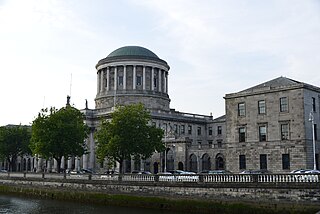Roe v. Wade, 410 U.S. 113 (1973), was a landmark decision of the U.S. Supreme Court in which the Court ruled that the Constitution of the United States generally protected a right to have an abortion. The decision struck down many abortion laws, and caused an ongoing abortion debate in the United States about whether, or to what extent, abortion should be legal, who should decide the legality of abortion, and what the role of moral and religious views in the political sphere should be. The decision also shaped debate concerning which methods the Supreme Court should use in constitutional adjudication.
Griswold v. Connecticut, 381 U.S. 479 (1965), was a landmark decision of the U.S. Supreme Court in which the Court ruled that the Constitution of the United States protects the liberty of married couples to buy and use contraceptives without government restriction. The case involved a Connecticut "Comstock law" that prohibited any person from using "any drug, medicinal article or instrument for the purpose of preventing conception". The court held that the statute was unconstitutional, and that its effect was "to deny disadvantaged citizens ... access to medical assistance and up-to-date information in respect to proper methods of birth control." By a vote of 7–2, the Supreme Court invalidated the law on the grounds that it violated the "right to marital privacy", establishing the basis for the right to privacy with respect to intimate practices. This and other cases view the right to privacy as "protected from governmental intrusion".
Abortion in Ireland is regulated by the Health Act 2018. Abortion is permitted in Ireland during the first twelve weeks of pregnancy, and later in cases where the pregnant woman's life or health is at risk, or in the cases of a fatal foetal abnormality. Abortion services commenced on 1 January 2019, following its legalisation by the aforementioned Act, which became law on 20 December 2018. Previously, the 8th Constitutional Amendment had given the life of the unborn foetus the same value as that of its mother, but the 36th constitutional amendment, approved by referendum in May 2018, replaced this with a clause permitting the Oireachtas (parliament) to legislate for the termination of pregnancies.

The Supreme Court of Ireland is the highest judicial authority in Ireland. It is a court of final appeal and exercises, in conjunction with the Court of Appeal and the High Court, judicial review over Acts of the Oireachtas. The Supreme Court also has appellate jurisdiction to ensure compliance with the Constitution of Ireland by governmental bodies and private citizens. It sits in the Four Courts in Dublin.
The Eighth Amendment of the Constitution Act 1983 was an amendment to the Constitution of Ireland which inserted a subsection recognising "the equal right to life of the pregnant woman and the unborn". Abortion had been subject to criminal penalty in Ireland since at least 1861; the amendment ensured that legislation or judicial interpretation would be restricted to allowing abortion in circumstances where the life of a pregnant woman was at risk. It was approved by referendum on 7 September 1983 and signed into law on 7 October 1983. In 2018, it was repealed by referendum.
Amendments to the Constitution of Ireland are only possible by way of referendum. A proposal to amend the Constitution of Ireland must first be approved by both Houses of the Oireachtas (parliament), then submitted to a referendum, and finally signed into law by the President of Ireland. Since the constitution entered into force on 29 December 1937, there have been 32 amendments to the constitution.
Patrick Mark Cooney is an Irish former Fine Gael politician who served as a government minister in the cabinets of Liam Cosgrave (1973–1977) and Garret FitzGerald. He served as a Member of the European Parliament (MEP) for the Leinster constituency from 1989 to 1994. He served as a Teachta Dála (TD) for the Longford–Westmeath constituency from 1970 to 1977 and between 1981 and 1989. He also served as a Senator for the Cultural and Educational Panel from 1977 to 1981.
Doe v. Bolton, 410 U.S. 179 (1973), was a decision of the Supreme Court of the United States overturning the abortion law of Georgia. The Supreme Court's decision was released on January 22, 1973, the same day as the decision in the better-known case of Roe v. Wade.

Attorney General v X, [1992] IESC 1; [1992] 1 IR 1, was a landmark Irish Supreme Court case which established the right of Irish women to an abortion if a pregnant woman's life was at risk because of pregnancy, including the risk of suicide.
Norris v. Ireland was a case decided by the European Court of Human Rights (ECHR) in 1988, in which David Norris successfully charged that Ireland's criminalisation of certain homosexual acts between consenting adult men was in breach of Article 8 of the European Convention on Human Rights.
Contraception was illegal in Ireland from 1935 until 1980, when it was legalised with strong restrictions, later loosened. The ban reflected Catholic teachings on sexual morality.
The timeline of women's legal rights (other than voting) represents formal changes and reforms regarding women's rights. The changes include actual law reforms, as well as other formal changes (e.g. reforms through new interpretations of laws by precedents). The right to vote is exempted from the timeline: for that right, see Timeline of women's suffrage. The timeline excludes ideological changes and events within feminism and antifeminism; for that, see Timeline of feminism.

In re Article 26 and the Regulation of Information Bill 1995 [1995] 1 IR 1 was a decision of the Supreme Court of Ireland after a referral by President Mary Robinson under Article 26 of the Constitution of Ireland. This is a procedure whereby the constitutionality of a bill is considered by the Supreme Court before it is signed into law, similar to the concept of a facial challenge in the United States. If the Court finds that it is constitutional, it may not later be challenged after its enactment.
This is a timeline of reproductive rights legislation, a chronological list of laws and legal decisions affecting human reproductive rights. Reproductive rights are a sub-set of human rights pertaining to issues of reproduction and reproductive health. These rights may include some or all of the following: the right to legal or safe abortion, the right to birth control, the right to access quality reproductive healthcare, and the right to education and access in order to make reproductive choices free from coercion, discrimination, and violence. Reproductive rights may also include the right to receive education about contraception and sexually transmitted infections, and freedom from coerced sterilization, abortion, and contraception, and protection from practices such as female genital mutilation (FGM).
Feminism has played a major role in shaping the legal and social position of women in present-day Ireland. The role of women has been influenced by numerous legal changes in the second part of the 20th century, especially in the 1970s.
In Irish political discourse, "an Irish solution to an Irish problem" is any official response to a controversial issue which is timid, half-baked, or expedient, which is an unsatisfactory compromise, or sidesteps the fundamental issue.
Bodily integrity is the inviolability of the physical body and emphasizes the importance of personal autonomy, self-ownership, and self-determination of human beings over their own bodies. In the field of human rights, violation of the bodily integrity of another is regarded as an unethical infringement, intrusive, and possibly criminal.
The Protection of Life During Pregnancy Act 2013 was an Act of the Oireachtas which, until 2018, defined the circumstances and processes within which abortion in Ireland could be legally performed. The act gave effect in statutory law to the terms of the Constitution as interpreted by the Supreme Court in the 1992 judgment Attorney General v. X. That judgment allowed for abortion where pregnancy endangers a woman's life, including through a risk of suicide. The provisions relating to suicide had been the most contentious part of the bill. Having passed both Houses of the Oireachtas in July 2013, it was signed into law on 30 July by Michael D. Higgins, the President of Ireland, and commenced on 1 January 2014. The 2013 Act was repealed by the Health Act 2018, which commenced on 1 January 2019.
Timeline of women's legal rights (other than voting) represents formal changes and reforms regarding women's rights. That includes actual law reforms as well as other formal changes, such as reforms through new interpretations of laws by precedents. The right to vote is exempted from the timeline: for that right, see Timeline of women's suffrage. The timeline also excludes ideological changes and events within feminism and antifeminism: for that, see Timeline of feminism.

The legal career of Mary Robinson, which occurred prior to her becoming President of Ireland in 1990, lasted over 22 years. Made a barrister in 1967, Robinson specialised in constitutional, criminal, and European community law.



